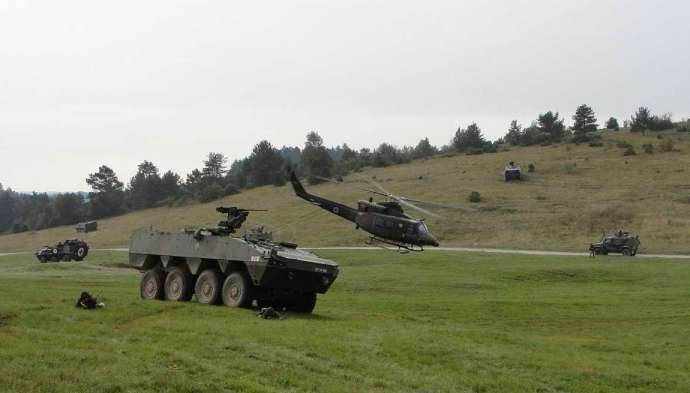STA, 14 February 2019 - The Postojna city council has decided to demand full closure of the Slovenian Armed Forces' main training area known as Poček, a vast area of forests and meadows in the south-west of the country. The municipality's official stance is now expected to be the basis for the Defence Ministry to decide on further steps.
Given the long-standing opposition to the army's training in the Poček area, the decision was largely expected. It came after Defence Minister Karl Erjavec asked the mayor in January to lay down the parameters acceptable for Poček to continue operations.
Erjavec said at the time that if the demands were such as to prevent Poček from remaining the main training area, the ministry would try to find other solutions.
The Poček military ground features an almost 2,000-hectare unpopulated area owned by the government and managed by the ministry since independence in 1991.
The wider area subject to restrictions when war games are under way comprises some 8,200 hectares, enabling the Slovenian Armed Forces (SAF) to train there and occasionally have international exercises and training with NATO parter countries.
It is no coincidence that Poček is the SAF's main training area as it was a military training ground before, used from the mid-1970s until 1991 by the Yugoslav army.
While Poček had been used as pastures for horses of the Vienna royal court from the early 18th century until 1915, Postojna, being a border area, was heavily militarised between 1915 when Italy declared war on the Austro-Hungarian empire and occupied the area, and WWII.
Since the area was in state ownership, it was relatively easy for the Yugoslav army to turn it into its training area, having purchased some more land from private owners in the 1970s.
But in 2000 the municipality held a consultative referendum at which Postojna locals decided on Poček's gradual closure.
Despite the people's will, Postojna and the ministry reached in 2004 an agreement on the military infrastructure in the area setting down their interests.
The accord, from which Postojna withdrew last December, set some limits on military activity, for instance a ban on shooting at weekends and on holidays, or limiting night shooting to ten days a month and until 11 PM from the beginning of June to the end of September.
But Mayor Igor Marentič says the army does not always stick to this. "Shooting is being carried out all months and at all times, regardless of tourism, and it is annoying even if it is announced in advance."
Water safety among major concerns
There are four things that bother locals: the noise coming from shooting and low flyovers, closure of air space (which affects the local airport), closure of the Poček area during exercises, and most notably water pollution.
Although locals could perhaps put up with occasional air space closures, pollution of the Malenščica water source for Postojna and Pivka would be a risk to public health.
While Marentič says the municipality has not commissioned any water monitoring or tests, the Karst Research Institute says its research has proved that waters from the Poček area travel underground towards the source of the Malenščica.
It adds that rain water in sensitive karst areas seeps underground very fast without having the opportunity to be cleaned, so it urges preventive measures.
Meanwhile, soil tests carried out by the ERICO institute in 2006 and 2009 showed "a strongly increased content of some heavy metals, primarily lead and copper", but its monitoring since 2016 has shown the heavy metals have not increased compared to previous measurements.
Also, Malenščica water monitoring by the Environment Agency, the ministry and the local water suppler have proved the concentrations were in line with drinking water standards.
The ministry has told the STA it is preparing a risk analysis to establish if certain military activity could have negative consequences for water quality in the area, while the municipality is drafting a bill to protect the water source.
Is a different solution still possible?
Erjavec indicated at his meeting with the mayor the army could go abroad for major war games and transfer some of its activity to other parts of Slovenia.
But pundits believe the attitude to Poček might be different if the SAF strictly respected the agreed rules and if the locals felt they benefited from it in some way.
Some foreign partners cannot understand the locals' opposition, but a well-placed source says "not a single job in this area is connected with Poček and the SAF does not get its supplies locally".
"If Poček is of national importance then the government could finance that, it would be only fair if the burden was shared by the local community and the state."
The ministry says it does not pay the municipality any compensation. However, on the basis of the 2004 accord, it co-funded local public infrastructure to the tune of EUR 3.1m and transferred property worth EUR 1.5m onto it in 2004-2018.
At the moment, the two sides are at odds over EUR 300,000 the ministry should pay for the new fire and rescue centre in Postojna, while it is also contesting the payment of EUR 1.3m in the duty for the use of land in Poček for 2013-2015.
Asked whether Postojna is opposed to Poček because it wants to develop into a green tourist destination, the mayor says this is not entirely so and stresses they have absolutely noting against the Slovenian army as such.
He notes, however, that while it is practically impossible to get an environmental permit for anything, "there are planes coming from other countries, shooting above this small tourist town".
"It's no longer appropriate to carry out such large-scale shooting with such heavy weapons only a kilometre in air line from the first settlements," he told the STA before the city council opted for closure.
Just yesterday, Defence Ministry State Secretary Klemen Grošelj told the parliamentary Defence Committee "intensive dialogue" was under way with the local community.







